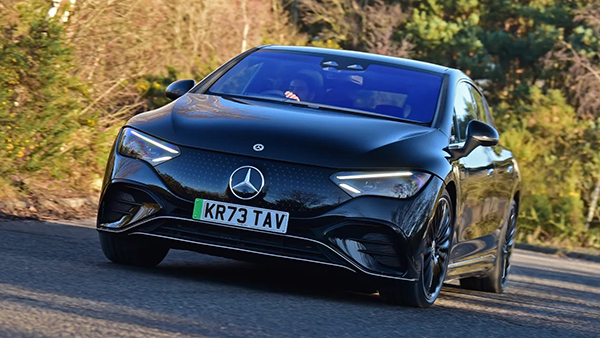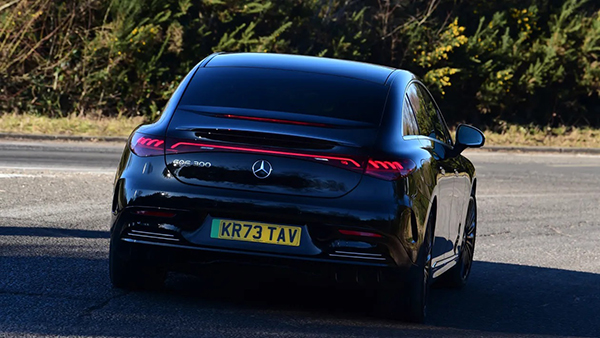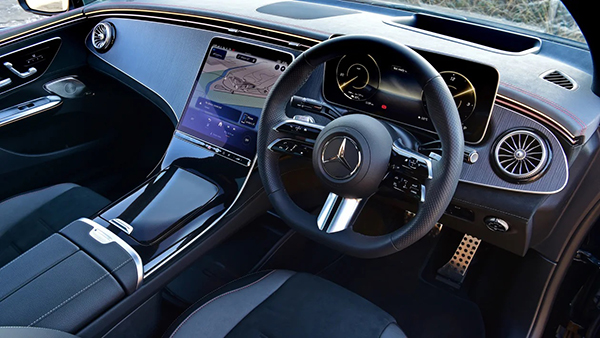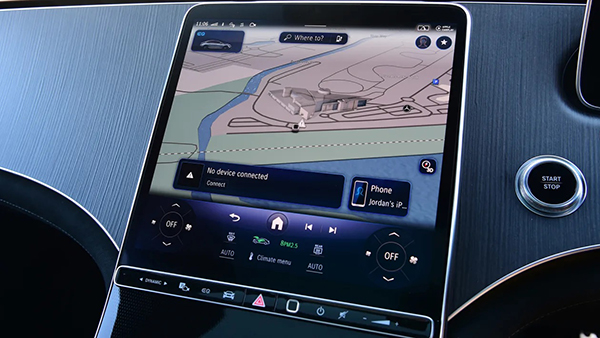As you might expect with such an executive EV, the Mercedes scores highly on comfort and refinement, with great tech and real innovation. But the fundamentals are what let it down, because the Mercedes EQE can be difficult to drive confidently or smoothly, thanks to issues including its brakes and general handling characteristics.
– Mileage: 2,132
– Efficiency: 2.6 miles/kWh

It’s not often that we get the chance to experience a genuinely all-new car. Gentle evolution has generally been the key to success across 120 years of motoring, but electrification has turned this all on its head. And for Mercedes, the all-electric EQE is that giant leap – a new take on the executive car.
There’s no doubt the EQE certainly looks different, and it elicited responses both good and bad from friends and family that occasionally came along for a ride. It’s never quite sat right with me, and has taken a while to put my finger on it, but I’ve come to realise the EQE appears to be modelled on a computer mouse.
In any case, it’s been a fascinating experience to have an EQE for an extended period of time because there is so much to unpack. We can now confidently say we know the ins and outs of the EQE – the good, bad and the ugly.
First up, key elements for this type of car, such as refinement, tech and interior space, were very impressive. It’s fully electric, so you’d expect a certain amount of this, but the EQE’s sensory-deprivation levels of quietness were always appreciated. It’s also a big car, and had an impressive amount of space in the second row.
Lots of the high-end tech we’ve talked about in previous reports, such as the headlights, were another clear indication of where Mercedes is going very well.
But the EQE had flaws, and after nearly five months the car’s dynamic issues can’t be attributed to a lack of familiarity. Putting it bluntly, the driving experience still needs a lot of work. A particular lowlight dominated every single drive, and that was the brakes. The pedal didn’t only lack feel, but the correlation between input and braking performance was not consistent. Press the pedal and the actual level of braking felt different every time. Not good for confidence or your heart rate.
At high speeds, a push of the pedal would sometimes offer next to no braking at the top half of the travel, causing a slight panic as I then pushed harder only for the friction brakes to kick in and throw my head forward. At low speeds, it was nearly impossible to come to a smooth stop, and sometimes the regenerative braking would bleed off without my foot coming off the pedal, forcing me to once again push deeper into the pedal to avoid an embarrassing low-speed shunt into the car in front.
What’s worse, the autonomous emergency braking function wasn’t the slickest, so on multiple occasions it brought the car to an emergency stop, even though my foot was on the pedal.
There were other dynamics issues, too, such as the fact the car was far too softly sprung for the speed of the steering rate. This caused the car to lurch and roll excessively, even at low speeds. The rear-wheel steering of our model only accentuated this, giving the car overly aggressive turn-in, and never felt natural or intuitive – but we will say the city car- like turning circle was always appreciated.
At higher speeds, the large wheels and low-profile tyres turned the usually plush ride upside down, smashing into potholes and shuddering the whole structure with every bump in the road. The chassis felt wayward and remote, and the fact this car weighs more than a full-size Range Rover was blatantly obvious at every moment.
Our 241bhp EQE 300 powertrain was also only just enough to motivate the car – here the 7.3 second 0-62mph time feels a touch optimistic, yet any more power would just highlight how far the handling set-up had to go to even get close to that of the new E-Class. That weight also affected the EQE’s overall efficiency – even on a slow-moving motorway in warm weather, without any air-conditioning, we weren’t able to better 3.1 miles/kWh – which wasn’t great.

Executive cars never need to be fun to drive, but to be dynamically competent is a basic requirement, and the EQE has some way to go in this respect.
There were other aspects of the car that grated on me, too, such as the poor forward visibility, fiddly steering wheel controls or the fact a general latency to the parking sensors caused them to chime in every time I pulled away.
We can’t deny the ambition from Mercedes: to take a traditional three-box executive saloon and reimagine it to such a degree takes extreme bravery. And while it hasn’t quite paid off this time around, we do at least know that there have been lessons learned. From here, Mercedes has no doubt grown its understanding of high-end EVs and we’re told learnings will be implemented next time around. Until then, though, the EQE’s highs just aren’t offset by the lows – which is saying something, because there’s still lots here to like.
Mercedes EQE 300: second report
Hi-tech headlamps light the way for our luxury cruiser
– Mileage: 1,481
– Efficiency: 2.6 miles/kWh
We’re now a good way into our stint with the moody black Mercedes EQE, and during the bleak winter months there has been a particular highlight to driving around in the gloom. Being a top-spec Premium Plus, our car features the firm’s Digital LED headlights, and they are a truly brilliant innovation.
Bright LEDs aren’t inherently new tech – almost all new cars feature them – but it’s in the active-lighting arena where they can vary. This is an area in which Mercedes has always been right at the forefront of technology, and this is demonstrated on the EQE.
As well as standard full and dipped beams, the Digital aspect is where things get really advanced, because it uses up to 1.3 million individual light pixels to actively adjust the light around other road users. Starting with the active full beam, this type of function – which is often called a Matrix beam in other cars – essentially runs the full beams all the time in non-urban environments, while actively blocking sections of that light in real time to avoid dazzling other drivers.
More rudimentary applications of this type of lighting tech might block out large vertical sections, or only light up the roadside, often reacting a fraction too slowly and therefore momentarily blinding oncoming traffic. The EQE’s system is far more accurate, blocking perfectly sized squares of light on all sides of the traffic, even with multiple cars in front.
It actively traces their position using a selection of cameras and clever computing. This is a complex operation, but we have never once been flashed in retaliation, no matter the traffic situation ahead.
The lighting tech goes much further, too. A favourite feature is the narrow-lane function, which activates when the car recognises it is approaching roadworks. It first projects a roadworks warning onto the road ahead, before lighting a path forward, the exact width of the EQE, to help navigate narrow lanes. This helps to avoid knocking over traffic cones or bashing your mirrors into temporary bollards.
It’ll also issue a visual projection warning if you follow a car ahead too closely, and even recognises certain road signs and repeats them on the road in front. If you’re driving in an area without streetlights, it’ll recognise hidden pedestrians, shooting over a spotlight towards them to highlight their presence – although we do have to admit that it could be somewhat alarming to be the pedestrian in that situation.

Yet beyond all of these safety elements, the headlights also have their party tricks. On entry, the car will briefly flash one of several lighting patterns, effectively treating each headlamp as a video projector. In fact, Mercedes engineers tell us the resolution is so high, they could technically project a movie through the system in black and white, although the aspect ratio is definitely more suited to automotive applications.
Now don’t get us wrong: there is a lot of superfluous technology being implemented into modern cars, and the EQE is not immune to this. For instance, there are several odd ‘ENERGIZING’ modes that will flash different colours through the cabin’s ambient lighting, set the temperature and play questionable music to relax, invigorate or refresh you as you drive along. However, Mercedes’ Digital headlights are most definitely a positive addition to the automotive tech.
Beyond entertaining us with its flashing lights, our EQE has been doing a fine job as a supremely calming urban cruiser. Aside from a sometimes brittle ride that makes a bit of a mess of potholes – a compromise of those big 21-inch wheels we mentioned in our first report – the Mercedes is a serene counterpart that makes short work of slow-moving journeys of any length.
The 12V battery issue has also now been resolved, with no repeat of the problem previously noted, even when the car has been unused for a few days at a time. And as we dig deeper into its toybox, we’re really beginning to enjoy the superb sound system and sheer usefulness of the four-wheel steering when traversing tight London streets. Efficiency is also improving as the temperature rises, although it’s still some way short of its on-paper range.
However, as we will come to in our next report, in which we unpack its handling, steering and brakes, when things speed up a bit, the EQE sadly loses some of its lustre…
Mercedes EQE 300: first report
We visit legendary venue to collect our new electric Mercedes EQE saloon
– Mileage: 682
– Efficiency: 2.3 miles/kWh
Welcome to the future. Or what Mercedes would like you to think is the future. The transition from ICE to EV is a constant battle, evidently, in your affections, but it has rarely been more stark than in the executive-saloon class.
New to our fleet is a Mercedes EQE, which is in effect an all-electric alternative to the E-Class saloon, representing the very pinnacle of Merc’s electric car technology. Like the larger Mercedes EQS, it sits on the brand’s bespoke electric architecture, but unlike BMW’s rival 5 Series, it diverges from the petrol-powered saloon in almost every aspect.
Our model is an EQE 300, featuring the entry-level single-motor powertrain that produces 241bhp and 550Nm of torque. Mercedes says this will be the most popular variant, and with the 90kWh battery pack, it claims up to 337 miles of range. It’s not a fast car, but then, sporty driving dynamics are not top of its potential buyers’ wishlists.
Being a top-spec AMG Line Premium Plus, it has all the bells and whistles, including a Burmester stereo, a panoramic glass roof, heated electric seats, adaptive air suspension, rear-wheel steering, digital headlights and Mercedes’ 11.4-inch touchscreen interface and fingerprint recognition.

But it also has 21-inch wheels that have a detrimental effect on range – 40 miles less than models on smaller wheels. The only optional extra is the no-cost Obsidian Black paintwork, but there are some big numbers to consider, namely the extraordinary £86,345 price tag and 2,535kg kerb weight.
We’ll think about those two figures in due course, but now it’s time to start getting under the skin of this new-generation car. Everything, including the car’s underlying packaging, aerodynamics, design and digital make-up are essentially new for Mercedes.
Which is why we’ve decided to start our time with it in a cradle of automotive innovation, the Brooklands Circuit. As well as being the home of Mercedes-Benz World, this was also one of the world’s first purpose-built race tracks. Brooklands represents a sense of innovation that Mercedes is so keen to channel into its new EVs.
From the Mercedes-Benz streamliners that were constantly on the verge of new land-speed records in the twenties and thirties, to the 300SL Gullwing of the mid-fifties, all represented quantum leaps forward in their fields, something the EQE is aiming to mirror. So the question is whether Mercedes has chosen the correct direction for its new electric luxury car.
We’ll have a clear answer after a few more months, but early impressions are that the EQE is very comfortable and extraordinarily refined. However, we’ve also had a bit of bad luck, when a half-dropped manhole cover took out both passenger-side tyres after barely 300 miles. That wasn’t the fault of the EQE, but it did highlight the reality of 21-inch wheels on such a large, softly suspended car.
Mercedes’ roadside assistance service did all it could, but wild weather and localised flooding on the day meant recovery vehicles were scarce, leading to a fair old wait in the back seat. No matter – a nearby coffee shop and just enough battery on my laptop made it a perfectly useful remote office.
The EQE also seems insistent that the 12V battery is dead or dying, both on the dash and on the MercedesMe app, yet it comes to life without issue when the starter button is pressed. This doesn’t affect anything while I’m driving, but it won’t then allow any remote services like preheating, which is a drag when it’s been below freezing overnight.
Anyway, the car has now returned from a brief stint back at Mercedes, so we’ll get to stretch its legs and see what else is hiding underneath the EQE’s smooth skin. Best we buckle up, because there’s a lot to get through.
2025 Mercedes-Benz EQE 300 AMG Line Premium Plus Review
02/07/2024
No Comments
Mercedes-Benz | Mercedes-AMG
Click to rate this post
[Total: 1 Average: 5]